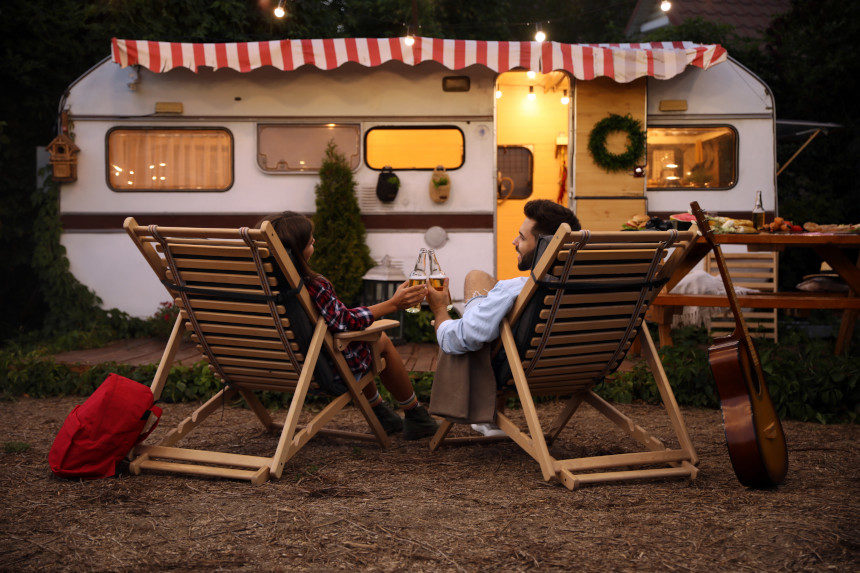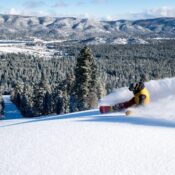Follow Molly Barnes’ adventures on Digital Nomad Life.
It’s been three years since my boyfriend and I committed to our nomadic lifestyle, and it’s one of the best decisions we’ve ever made.
I wrote my first article for The Saturday Evening Post two years ago, talking about how to afford this kind of life. Since then, Jacob and I have learned a lot more, not just about finances, but also relationships, organization, and maintaining balance.
We’ve learned what to do, and what not to do. When you’ve covered as many miles as we have, you run into your share of potholes and bumps in the road — both literally and figuratively!
But you also see more beauty than you ever thought could have possibly existed. Sure, people tell you about the Grand Canyon and Yosemite, about the Florida Keys and Niagara Falls, but you don’t get a sense of just how majestic these places are until you see them for yourself.
Plus, there are so many other hidden gems off the beaten path that you may never have heard of. Once you see them, you’ll never forget.
Here are a few lessons I’ve learned so far.
Relationships
When you’re stuck in a small space much of the time, relationships can be a challenge. Jacob and I have learned more about each other from living in such close quarters than we ever imagined. For instance, noise-cancelling headphones cannot compete with Jacob’s radio singalongs, so it’s best to schedule work calls when we’re parked. We’ve grown closer, but there are also those times (fortunately, not too often) when we get on each other’s nerves.
That’s why it’s important to plan alone time. One of the great things about the nomad life is that, even though you spend hours within the confines of your RV, once you stop and step outside, the world is your living room, playground, or oyster. (Pick your metaphor.) I can’t count the number of times we’ve landed in a new destination only to immediately go our separate ways. I usually head to a hot yoga class while Jacob seeks out a pint of locally brewed craft beer.
But it’s not just your relationship with your partner you’ve got to nurture. Maybe you have kids, parents, or siblings along for the ride. Or maybe you have pets. You have to make accommodations for them, too: give Rover room to run, sniff, and explore. Mapping out dog parks can be a great start.
Then there are the people you meet along the way. You’ll find all kinds, from friendly strangers to loners who don’t want to be bothered with you. Customs and attitudes change from place to place, and you learn to be sensitive to that (when in Rome, right?), but you also learn that courtesy is pretty much a universal language.
Finances
When it comes to finances, preparation is the key. You have to plan a little differently when you’re living on the road, and it can seem overwhelming when you start.
Just like if you were living at home, you’ll want to sketch out a budget. But when you’re on the road, there are some things you wouldn’t have to worry about when living in one place.
For example, you don’t have a mortgage — but you do have to set aside money to pay for campgrounds and RV parks, and the cost can vary from one place to the next. Do your homework ahead of time and book in advance so you’ll know what to expect. Discount clubs can offer great ways to save, but make sure there are enough locations to make it worthwhile.
For short stays, we try to book a Harvest Host or Boondockers Welcome site free of charge, but space is limited at these non-traditional sites. If you don’t book in advance, you can end up paying a premium for an RV site at a campground. We learned that the hard way as RV newbies when we were in Tennessee at a music festival. We ended up paying more than $100 for one night, which blew our budget for the entire weekend.
You’ll also have to deal with the cost of gas, which can change pretty dramatically from one state to another. And remember, an RV gets a lot worse gas mileage than a Prius or a Mini Cooper!
Have some cash on you, just in case you’re out in the boondocks where they don’t accept plastic or their card reader is down. From experience, you never know when you’ll get lost in the middle-of-nowhere Georgia and nearly run out of gas before you find an old station that only accepts cash. We only had a few dollars, but the kindly owner let us fill up anyway. It’s a great story, but I never want to be in that position again.
You should keep your credit handy, too, for emergencies. If you don’t feel comfortable with credit or need to build yours up, a secured account linked to your card can be a great idea. That way, the money in the card account is your credit limit — so you won’t overspend, but you’ll have it there if you need it.
Organization
There’s no question about it: When you’re on the road, you need to be more organized than you are at home.
If you’re used to throwing everything into your suitcase for a vacation, that’s likely not going to work. You don’t want to feel so cramped in your RV that it’s stifling — especially if you’re driving through the Mojave Desert. And because of that limited space, you won’t want to buy too many souvenirs, either. However, you do want to make room for items that bring you joy. I collect records, but they take up too much space to keep them all in the rig all the time. So I keep my current favorites on the wall in album frames that pop out for easy access to the record. As an added bonus, they double as decor.
On the other hand, be sure to pack the necessities, like your meds, phone chargers, tissues, snacks, and drinks. And if you’re camping out, a frying pan, coffeepot, utensils, etc. A good checklist will become your best friend for everything from getting your RV on the road for the first time to making sure you have everything you need in the event of an emergency. And if you start to run out of space, get creative and think about a roof rack and a holder to hook your bike onto the back.
Expect the Unexpected
Enjoy the ride, but don’t forget to plan for the unexpected — and avoid it if possible. Since you’ll be driving a lot, it’s important to keep up on your vehicle maintenance, with regular oil changes and tire checks. Breaking down can be a much bigger problem in unfamiliar territory, so be sure you have enough tread on your tires and an emergency road kit just in case.
Since you’ll be on the road all the time, consider investing in roadside assistance, and be prepared for rough weather. Keep an app on your phone that can alert you to stormy weather and another to forewarn you of dangerous road conditions (flooding, black ice), closures, accidents, and construction.
Balance
Then there’s food. Since you’re “out,” there’s a temptation to always eat at restaurants and fast-food joints, or grab snacks at the next convenience store because it’s, well, convenient. But you’ll spend a lot more money that way. It’s cheaper to look for supermarkets that offer better deals on meals you can prepare yourself.
On the other hand, stay open to eating out, especially to try local specialties. If you’re traveling across the country, it’s a crime not to try the Cajun food in New Orleans or that Cape Cod lobster.
The nomadic lifestyle is definitely a matter of balance in more ways than one. The lessons you learn will serve you well as you make your journey. We’ve learned plenty in our three years on the road, and I’m sure we’ll learn just as much, if not more, in the next three.
But learning is part of the fun. I never would have guessed 10 years ago that I’d be here today, but I wouldn’t trade it for the world.
Featured image: New Africa / Shutterstock
Become a Saturday Evening Post member and enjoy unlimited access. Subscribe now




Comments
What a wonderful article about traveling and how to do it well. If I were 20 years younger and had a wonderful friend with whom to travel, I certainly would refer to the suggestions given here.
Spent ten great years doing that! Wish we could continue! But time catches up eventually. Had some great times.